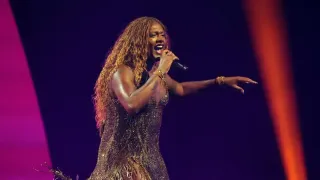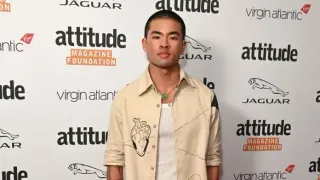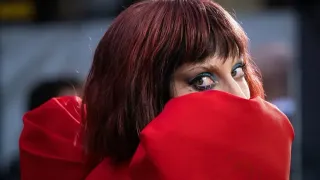
4 hours ago
'Shazam!' Star Asher Angel’s “Twunk” Transformation Has Queer Internet in a Frenzy
READ TIME: 3 MIN.
When Asher Angel, the cherubic-faced star of DC’s Shazam!, posted a series of gym selfies this week, the queer internet was not ready. The photos—featuring a newly sculpted physique, biceps that could bench-press a supervillain, and a shirt straining at its seams—sent shockwaves through LGBTQ+ Twitter, Instagram, and TikTok, triggering a collective meltdown equal parts admiration, thirst, and pure meme mayhem .
'SHAZAM' star Asher Angel shows off his transformation in a new TikTok
OMG?!?? pic.twitter.com/uplEeElHFd
— ✰ (@MENin4K) November 13, 2025
The transformation is more than just a viral thirst trap; it’s a seismic shift in how young male stars manage their image, how the queer community responds, and how “twink” and “twunk” aesthetics continue to evolve in the digital age.
Within hours, Angel's photos had racked up tens of thousands of likes, with LGBTQ+ fans and allies flooding the comments with a mix of gasps, heart emojis, and witty one-liners. The term “twunk”—a portmanteau of “twink” (a slim, youthful gay man) and “hunk”—was trending, with users declaring, “The twunkification of Shazam is complete!” and “When did Asher Angel get jacked enough to fly without the cape?” .
— Asher Angel (@asherangel) November 11, 2025
One viral tweet read, “Uhm… hello? When exactly did Shazam! star Asher Angel decide to walk into the gym and walk out looking like he could bench-press the entire DC universe?”—perfectly encapsulating the collective bewilderment and delight .
The language around Angel’s transformation is steeped in queer-coded internet speak. “Twink” and “twunk” are terms that have long been used in LGBTQ+ circles to describe body types, often with a wink and a nod to campy, self-aware humor. For many, the embrace of “twunk” status is a rite of passage—a move from boyish charm to adult allure, celebrated (and sometimes playfully mourned) by fans.
#fitness pic.twitter.com/NGqR4TgMwE
— Asher Angel (@asherangel) October 15, 2025
This isn’t just about thirst. It’s about representation and the evolution of gay male archetypes in pop culture. The “twunk era” signals a blend of youthful energy and grown-up confidence, a body-positive celebration that resonates with queer audiences who have often seen their own desires marginalized or caricatured in mainstream media .
Angel’s transformation comes at a time when conversations around body image and masculinity are front and center in queer spaces. The reaction isn’t just about aesthetics—it’s about agency, visibility, and the ways LGBTQ+ people see themselves reflected (and desired) in the public eye.
New week loading.... pic.twitter.com/GzTIFPoiH5
— Asher Angel (@asherangel) September 28, 2025
Fans have taken the opportunity to riff on the power fantasy of a superhero physique—“Finally, a Shazam I can root for!”—while also using the moment to discuss the pressures young celebrities face to transform their bodies, and how those pressures intersect with queer expectations and fantasies .
The queer internet doesn’t just observe; it participates. Within hours, memes began circulating: Photoshops of Angel’s face on classic superhero bodies, TikTok soundbites remixing his gym reveal with RuPaul quotes, and threads debating whether his transformation marks the “end of the twink pipeline” for Gen Z stars. It’s playful, it’s irreverent, and it’s deeply rooted in the way LGBTQ+ audiences remix mainstream pop moments for their own joy and community .
Call it rodeo prep. pic.twitter.com/Vb52HSFoJ2
— Asher Angel (@asherangel) May 25, 2025
Angel’s viral moment is part of a broader trend: young stars embracing queer-coded aesthetics, engaging directly with LGBTQ+ fandoms, and (consciously or not) challenging norms about masculinity, desirability, and self-presentation. In a media landscape that often marginalizes queer voices, these moments of shared internet frenzy are more than just fleeting trends—they’re sites of visibility, affirmation, and (yes) collective thirst.
For queer fans, the arrival of Asher Angel’s “twunk era” isn’t just a body transformation. It’s a sign that mainstream pop culture is increasingly shaped by LGBTQ+ tastes, humor, and language. It’s about celebrating the spectrum of desire, the joy of shared internet chaos, and the ongoing evolution of queer representation on the world stage .
As one viral commenter put it, “If this is what the next Shazam looks like, consider us ferally unwell—and loving every minute.”






